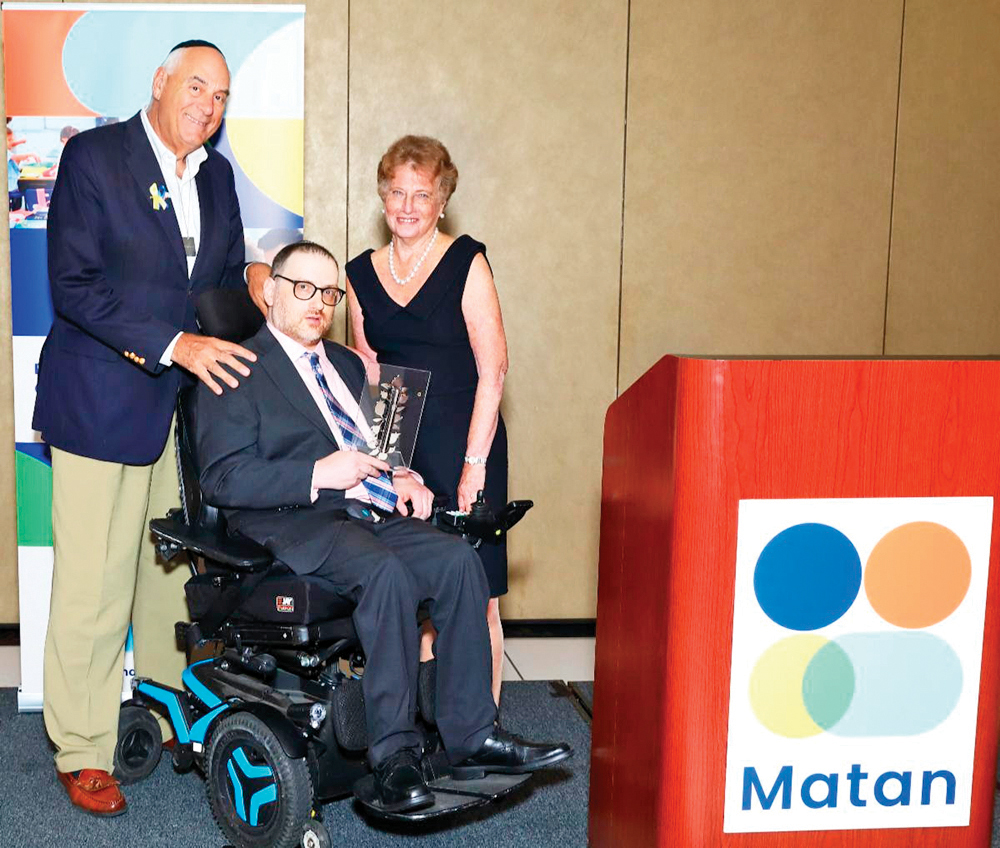The initiative, the Lieberman Fellowship for Professionals in Jewish Organizations Serving Young Adults, will kick off on Sept. 5.

(Courtesy of Matan) Matan, a national nonprofit organization promoting disability inclusion and belonging within North American Jewish communities, has launched a groundbreaking fellowship.
The Lieberman Fellowship for Professionals in Jewish Organizations Serving Young Adults is being made possible by the generosity of Jerry and Eileen Lieberman of Westchester County, New York and is a national initiative that aims to create systemic change in the way young adults with disabilities are included within Jewish communal life. It will do so by equipping Jewish communal professionals with the necessary tools and skills to create inclusive Jewish communities for young adults, many of whom developed deep connections to their Jewish communities as children and want to continue their Jewish journey.
Despite the plethora of Jewish communal programming geared toward young adults, people with disabilities often find it difficult to “fit in” or lend their talents, both literally due to physical barriers and figuratively because of attitudinal barriers. Matan believes that young adults with and without disabilities should be able to share meaningful participation in Jewish life.
According to the U.S. Census Bureau, 20% of young adults have a disability they were born with or acquired.
“Matan aims to change the landscape of Jewish communal organizations through ensuring that opportunities in programming, leadership engagement and employment for neurodiverse young adults become the norm,” said Dori Frumin Kirshner, Matan’s executive director.
“Many innovative initiatives for Jewish young adults pride themselves on ‘meeting people where they are,’ both supportive of various identities and ideologies and in how they connect to Judaism. However, disability inclusion has not been on the radar. As a result, many would-be participants and employees with disabilities do not feel that they belong. Disability is the missing piece of accessibility and equity. We want to lead the Jewish community through this crucial ‘next frontier’ of inclusion,” she continued.
Matan empowers Jewish community leaders and educators through training, coaching and consultations to provide purposeful, enriching and inclusive opportunities for people with disabilities and their families. Participants of past Matan training programs have reported in a commissioned evaluative study of the effect of Matan’s methodology and resources that their training with Matan had concrete and immediate impact on the ways they think about disability inclusion both internally (such as hiring practices and understanding the needs of employees and coworkers) and in their external programs and events.
Matan plans to utilize its long-standing and deeply effective Matan Institute cohort model to pilot the Lieberman Fellowship. Each cohort, which will run seven to nine months, will consist of in-person training days at the beginning and end, one-on-one coaching for participating organizations, continuous virtual learning sessions and an Inclusion Impact (capstone) Project from each organization. The fellowship will launch with three cohorts over a three-year period.
Matan will train participants in the fellowship on such topics as:
The role of Jewish values in creating an inclusive culture.
Defining disability and inclusion for young adults.
Accessibility, adaptations and logistical considerations for programming.
Marketing programs through the lens of accessibility.
Becoming a disability inclusion ambassador and learning concrete strategies to boost an organization’s inclusion efforts.
Creating opportunities for young adults with disabilities to become lay and professional leaders.
Adapting work environments to maximize comfort for neurodivergent individuals.
Professional development specifically for managers and leaders around workplace communications with neurodivergent individuals.
Flexibility and diversity with communication tools.
Understanding how flexible work policies can enhance inclusivity.
Adapting workplace conditions (such as temperature and quiet zones).
Adapting social programs in the workplace for neurodivergent individuals to build relationships.
“Jewish institutions are not thinking enough of who is currently being left out. They aren’t aware that they’re not aware, and this is something we would like to change,” Frumin Kirshner said. “We want them to be proactive, adjust and adopt flexibility to employees with special needs and disabilities. For example, we want them to assign someone on staff to be responsible for inclusion and belonging. We’re not only expecting them to hire young adults with disabilities, but to make sure that they include board members with disabilities and that they include young adults with disabilities in their programming and do so in a high-quality manner.”








